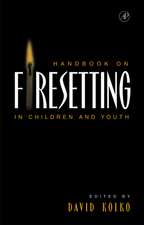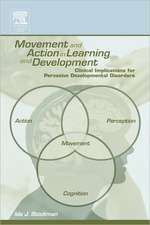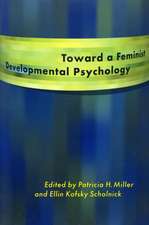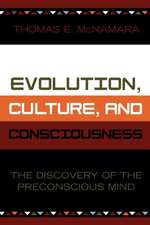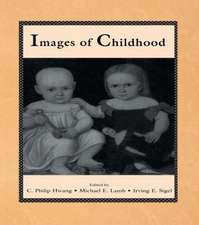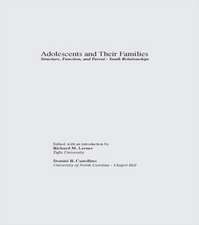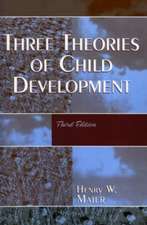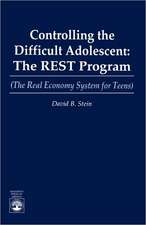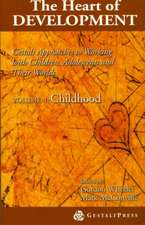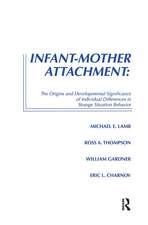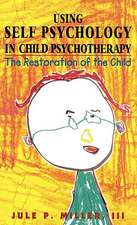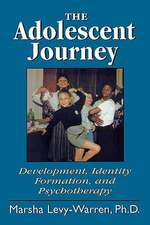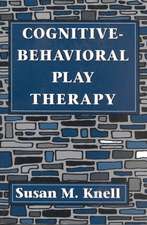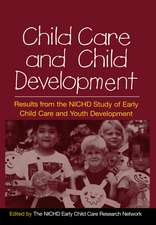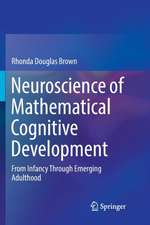Theories of Developmental Psychology
Autor Patricia H. Milleren Limba Engleză Paperback – 5 apr 2016
Preț: 479.64 lei
Preț vechi: 727.80 lei
-34% Nou
Puncte Express: 719
Preț estimativ în valută:
91.79€ • 94.70$ • 77.69£
91.79€ • 94.70$ • 77.69£
Carte disponibilă
Livrare economică 12-26 februarie
Livrare express 28 ianuarie-01 februarie pentru 94.91 lei
Preluare comenzi: 021 569.72.76
Specificații
ISBN-13: 9781429278980
ISBN-10: 1429278986
Pagini: 520
Dimensiuni: 154 x 232 x 24 mm
Greutate: 0.68 kg
Ediția:6
Editura: Worth Publishers
Colecția Worth Publishers
Locul publicării:New York, United States
ISBN-10: 1429278986
Pagini: 520
Dimensiuni: 154 x 232 x 24 mm
Greutate: 0.68 kg
Ediția:6
Editura: Worth Publishers
Colecția Worth Publishers
Locul publicării:New York, United States
Cuprins
Introduction
Piaget's Cognitive-Stage Theory and the Neo-Piagetians
Freud's and Erikson's Psychoanalytic Theories
Vygotsky and the Sociocultural Approach
Social Learning Theory
Information-Processing Theory
Ethology and Other Evolutionary Theories
Gibson's Ecological Theory of Perceptual Development
Contemporary Minitheories and Emerging Approaches
Piaget's Cognitive-Stage Theory and the Neo-Piagetians
Freud's and Erikson's Psychoanalytic Theories
Vygotsky and the Sociocultural Approach
Social Learning Theory
Information-Processing Theory
Ethology and Other Evolutionary Theories
Gibson's Ecological Theory of Perceptual Development
Contemporary Minitheories and Emerging Approaches
Notă biografică
Dr. Miller (Ph.D., University of Minnesota) is professor of psychology at San Francisco State University. She has held faculty positions at the University of Michigan, the University of Florida, and the University of Georgia and also has served as Department Head, Associate Dean, and Director of Women's Studies. Her research focuses on cognitive development during childhood. More specifically, she studies cognitive strategies, executive function, metacognition, memory, attention, social cognitive development, theory of mind, and gender.
Caracteristici
Focus on biological theories of development
Offers new instructor resource materials
Distinguishes the major theoretical schools of child development
Offers new instructor resource materials
Distinguishes the major theoretical schools of child development
Caracteristici noi
Table of Contents with New Edition Highlights 1. Introduction
- New coverage of developmental cascade - the effect of a child’s relationship with their parent on their teenage and adult relationships later in life.
- New discussion of the effect of experience on the brain in regard to language development.
- New discussion of Piaget’s theories of memory, the cognitive abilities of infants, social and emotional development, in light of current research.
- New Discussion of Kurt Fischer’s dynamic structuralism
- New discussion of developmental cognitive neuroscience and the role of new neuroimaging methods.
- Thoroughly revised contemporary research section.
- New coverage of recent theoretical work attempting to bring together contemporary attachment theory and psychoanalytic approaches
- Discussion of new predictive models generated by methodological and statistical breakthroughs on the effects of early social and emotional experiences on later development
- Thoroughly revise contemporary research section
- New coverage and research regarding identity development and the influence of racial and economic stratification.
- New coverage of how culture affects intellectual functioning including the effect of communication technologies.
- New discussion of research on the development of private speech.
- New discussion of how perception of intelligence varies by culture.
- New discussion of sensitivity of social cultural theorists to cultural differences.
- New discussion of problem based learning in the Applications section.
- Thouroughly update contemporary research section including new research on collaborative problem solving and cross-cultural research. And three new subsections Social Change elaborating on effects of social and cultural change on development; Immigrant Families exploring the process of development in the context of adapting to a new culture; and current trends in cultural psychological research discussing research aimed at exploring more specific dimensions of culture.
- Chapter has been fully revised to focus on biological approaches to development including all-new sections (Developmental Neuroscience, Genetics, and Integrated Multilevel Biological Perspectives) with discussion of epigenetic models, neuroimaging, neurogenetics and more.
- Updated discussion of collective efficacy
- New discussion of moral disengagement in regard to cyberbullying.
- New discussion of Coercive caretaker-child interactions in early development and effects on later behavioral problems in school.
- Throughly updated contemporary research section to include to new research on the role of imitation in learning including discussion of discovery of action mirroring, and the mirror neuron system as well as preschooler selective observational learning based on their perceived trust of the person they are learning from.
- New material on memory research in regard to negative events, for example abuse, and new research on the effects of multitasking on memory.
- Contemporary research section has been fully updated to discuss executive function, cognitive neuroscience, embodied cognition, Bayesian models, statistical learning, and developmental robotics.
- Contemporary research section has been fully revised, including new discussion of infants motor development and research advances made possible by neuroimaging.
- New coverage of theory of mind research, dynamic systems theory, and all new section on Core Knowledge theories.
Descriere
Patricia Miller's acclaimed text offers an ideal way to help students understand and distinguish the major theoretical schools of child development. This fully updated new edition includes a new focus on biological theories of development, and offers new instructor resource materials.

